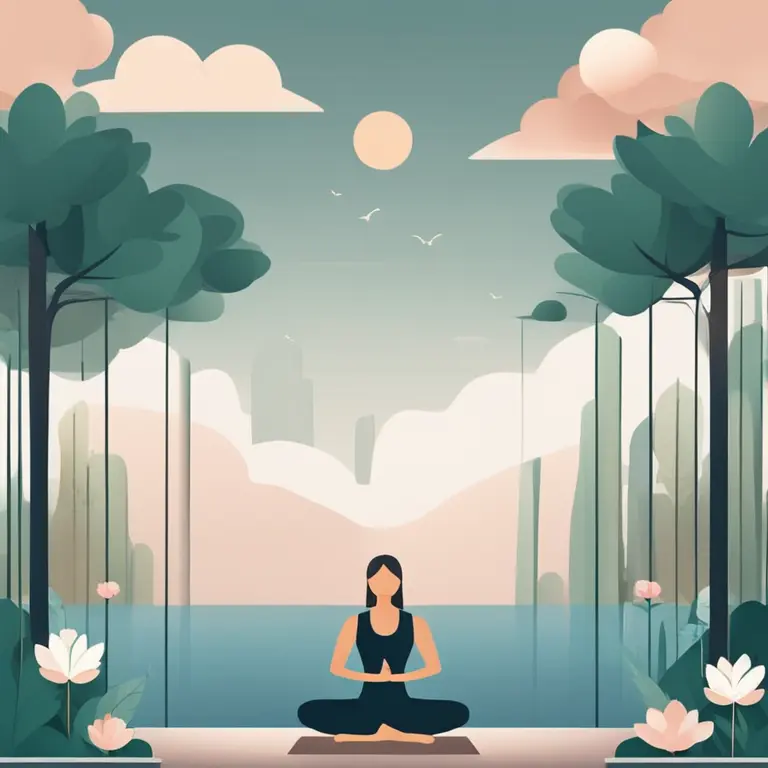
Soothing the Mind: Meditation for Stress Relief
Discover effective meditation techniques that promote relaxation and manage stress in our fast-paced world.
article by Hina Kurosawa
Introduction to Meditation for Stress
Meditation has surged in popularity as a proven stress-relief method amidst the hustle of the modern era. Its principles, rooted in ancient practices, are more relevant today than ever as we seek solace from the relentless pace of life. This article delves into various meditation techniques tailored to alleviate stress and enhance mental tranquility. Whether you're a novice or seasoned practitioner, these techniques offer a respite from daily pressures, fostering a calmer, more centred existence.

The Essence of Breath-Focused Meditation
Breath-focused meditation is a foundational practice central to many other forms of meditation. It involves concentrating on the natural rhythm of your breathing, which anchors the mind and keeps you present. As thoughts arise, gently guide your focus back to your breath. This method reduces stress by interrupting the incessant stream of thoughts that often leads to anxiety. Over time, this practice can lower heart rate and blood pressure, contributing to overall stress reduction.

Progressive Muscle Relaxation
Progressive Muscle Relaxation (PMR) is a technique that reduces stress by tensing and then relaxing different muscle groups. It enhances body awareness and highlights the contrast between tension and relaxation. Starting from the toes and moving upwards, tense each muscle for a few seconds, then release. Notice the sensations of release and how the stress seemingly evaporates from your muscles. PMR is particularly effective before sleep, as it can ease the transition into a restful state.

Mindfulness Meditation
Mindfulness Meditation teaches practitioners to observe thoughts and feelings without judgment. By focusing on the present moment, mindfulness reduces the impact of stress by preventing worry about future uncertainties or past regrets. The technique is simple: find a comfortable position, focus on your breath, and when your attention wanders, return it to the present. Mindfulness can be infused into everyday activities, such as eating or walking, making it a versatile tool for stress management.

Guided Visualization for Relaxation
Guided Visualization, or guided imagery, transports you to a peaceful setting of your choice through descriptive language and imagination. This mental escape can significantly lower stress levels by engaging the senses to bring about a sense of tranquility. Whether it's imagining a serene beach or a quiet forest, visualization capitalizes on the brain's power to affect the body and emotions, providing a quick retreat from the strains of reality.
Mantra Meditation for Focus
Mantra Meditation draws upon the repetition of a sacred word or phrase to silence the mind and induce a state of deep peace. The mantra can be spoken loudly or silently, depending on preference. The repetition creates a rhythmic vibration that helps center the mind, steering it away from distracting thoughts. As you dive deeper into the practice, stress diminishes, making space for a profound inner stillness and clarity.
Moving Meditation: A Dynamic Approach
Moving meditation, such as Tai Chi, Qigong, or walking meditation, combines deliberate movements with controlled breathing, promoting a meditative state. Perfect for those who find stillness challenging, these practices channel stress into motion, thereby releasing it. The fluidity of movement in sync with breath not only calms the mind but also benefits physical health, improving circulation and muscle tone.
Integrating Meditation into Daily Life
One of the greatest challenges is fitting meditation into a busy schedule. But even brief sessions can be highly beneficial. Start with just a few minutes each day and gradually build up. Use breaks during work to practice breathing exercises or engage in quick mindfulness sessions. By prioritizing these practices, you create a buffer against the day’s stressors, making them manageable and less overwhelming.
Conclusion: Embracing a Calmer Future
By incorporating meditation techniques into your daily routine, you can proactively combat stress and its detrimental effects. Experiment with various types to find out what resonates best with you and remember that consistency is key. With time, a few moments of meditation can transform into a comprehensive stress management strategy, paving the way for a more serene and balanced life in our ever-changing world.
Published: 2/12/2024
Modified: 2/12/2024
More predictions
Come back here soon to learn more about yourself and your future


Meditate Away Anxiety: Simple Techniques for Calm
Discover practical meditation techniques designed to ease anxiety and cultivate serenity in everyday life.


Varieties of Meditation: A Comprehensive Guide
Discover the diverse meditation techniques to enhance your mental wellness and spiritual growth. Delve into this guide for insight into the different paths of mindfulness.


Various Meditation Practices for Inner Peace
Discover different meditation techniques designed to promote tranquility, mental clarity, and spiritual growth in our comprehensive guide.